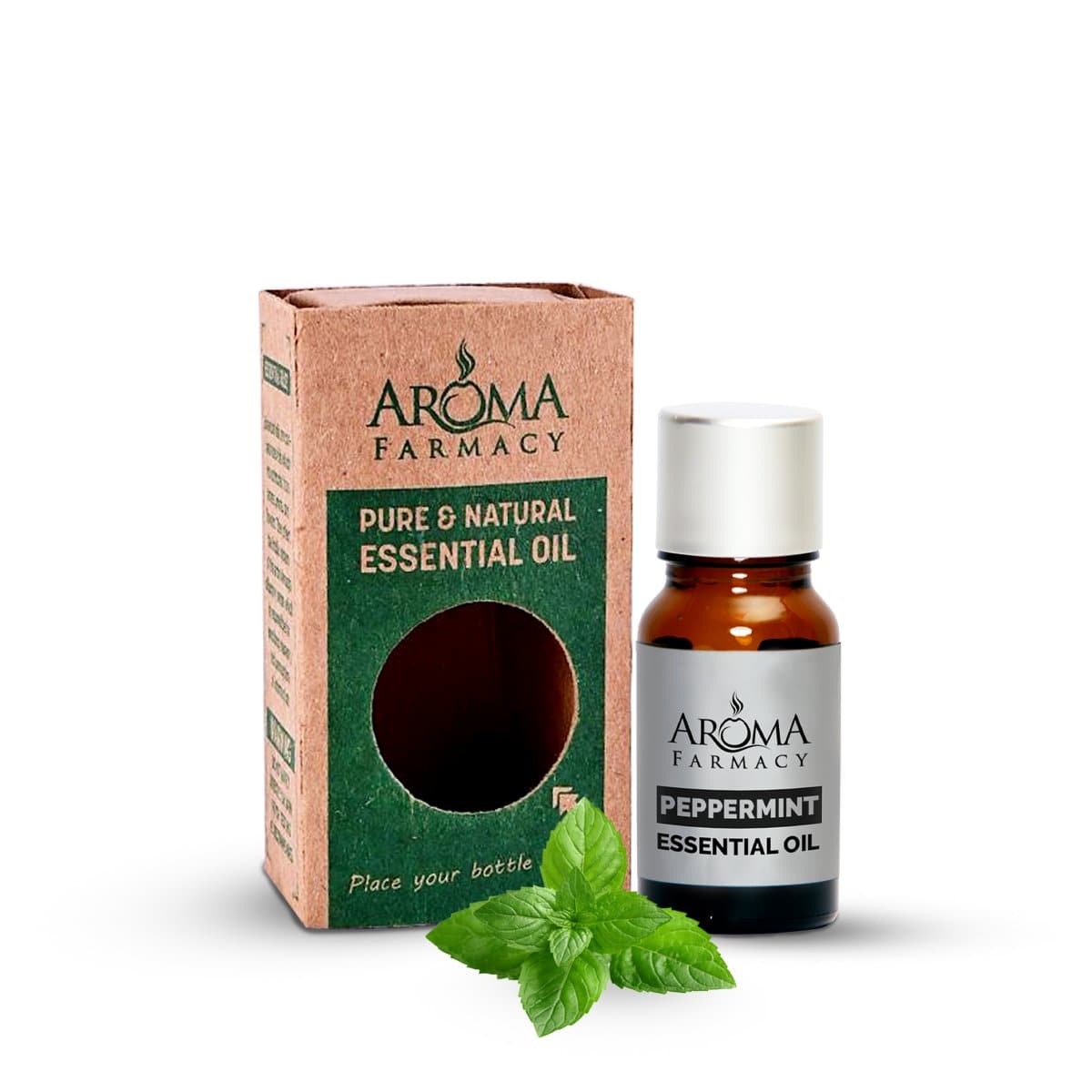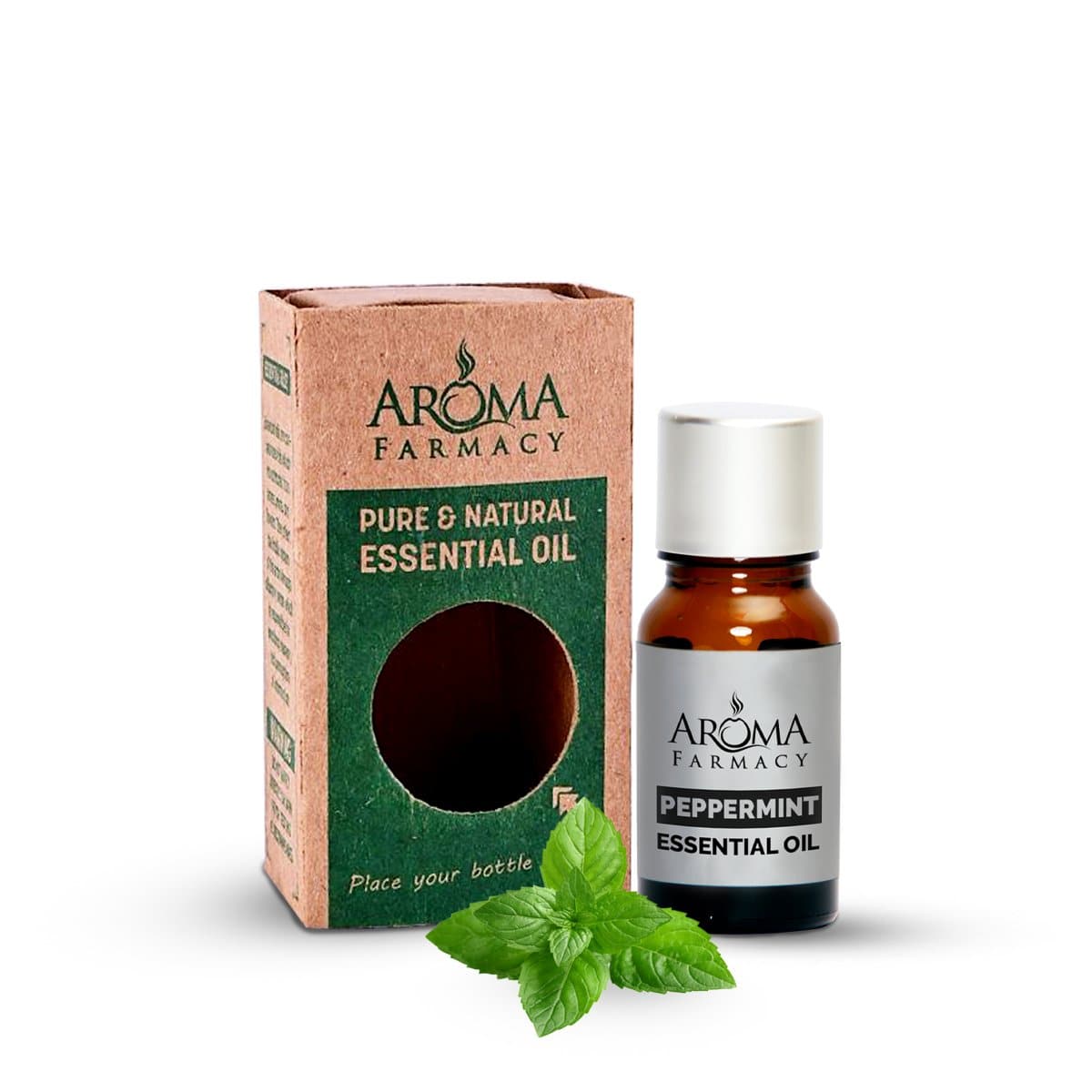Peppermint Essential Oil 100% Pure & Natural (Undiluted)
Peppermint Essential Oil 100% Pure & Natural (Undiluted)
Couldn't load pickup availability
At Aroma Farmacy, we source a Peppermint Oil (Mentha piperita) that doesn't just smell minty, it actually performs. Many commercial oils feel "weak" because they’ve been stretched with cheaper fillers. Ours is 100% steam-distilled and packed with natural Menthol, the compound responsible for that famous "icy-hot" sensation that relaxes muscles and opens up your airways.
It’s a must-have for any home. From soothing a bloated stomach to waking up your hair follicles, this is professional-grade Peppermint that gives you an immediate, cooling relief you can actually feel.
Product Details
- Botanical Name: Mentha piperita
- Origin: China
- Extraction: Steam Distilled
- Aroma: Sharp, fresh, and intensely minty.
-
Grade: 100% Pure Therapeutic Grade.
Why Choose Aroma Farmacy?
- ✅ Complete Disclosure: We provide GC/MS & COA reports for every batch. You deserve to know exactly what’s in your bottle.
- ✅ Always Fresh: Our Peppermint is sourced in frequent, small batches so the menthol stays sharp and potent.
- ✅ Professional DIY Grade: Perfect for making your own pain-relief balms, soaps, or cooling foot creams.
- ✅ Purity Guaranteed: Zero synthetic fillers, zero parabens, and absolutely no artificial "mint" fragrances.
- ✅ Easy Returns & Trust: Joined by over 50,000 customers in Pakistan—if it’s not the best Peppermint you’ve used, we’ll make it right.
How to use it for the best results
For Headaches & Muscle Pain
The menthol in Peppermint oil acts as a natural vasodilator, helping to relax tight muscles and improve blood flow.
- Tension Relief: Mix 2 drops with a teaspoon of Coconut or Almond oil. Gently massage into your temples, forehead, and the back of your neck. Keep it away from your eyes!
- Post-Gym Recovery: Add 5 drops to a carrier oil and massage into sore joints or muscles for that instant cooling effect that helps with inflammation.
For Hair Growth & Scalp Energy
Peppermint is one of the most powerful oils for stimulating the scalp. It increases circulation to the roots, which is vital for hair density.
- The Scalp Boost: Mix 2–3 drops with a carrier oil (like Castor or Coconut) and massage into the scalp. You’ll feel a distinct "tingle"—that’s the oil working to wake up your hair follicles.
For Sinus Relief & Digestion
- Breathe Easy: Add 3 drops to a bowl of hot water and inhale the steam to clear a blocked nose and soothe a cough.
- Tummy Tamer: For bloating, dilute 2 drops in a carrier oil and massage your abdomen in a clockwise motion. The cooling sensation helps relax the stomach muscles.
Perfect for DIY & Household Use
- Natural Bug Spray: Spiders, ants, and mice hate the smell of Peppermint. Mix 15 drops with water in a spray bottle and spray around windows and door frames.
- Handmade Products: Excellent for foot scrubs, lip balms (use very sparingly!), and refreshing kitchen soaps.
Price & Delivery in Pakistan
- Retail Price: Starting from Rs. 670 for 10ml.
- Wholesale & Bulk: Special rates available for gyms, spas, and local artisans.
- Fast Shipping: Reliable delivery to Karachi, Lahore, Islamabad, and all across Pakistan.
Safety & Storage
- FOR EXTERNAL USE ONLY.
- Avoid contact with eyes and sensitive areas.
- Avoid use during pregnancy.
Shelf Life: 2–3 years. Store in a cool, dark place to keep the menthol from evaporating.
Frequently Asked Questions - FAQs
-
Does peppermint oil kill lice?
Yes, peppermint oil's strong aroma and menthol content can help repel lice, but it is not a guaranteed treatment. Use it as a preventive measure by mixing a few drops in shampoo or carrier oil.
-
Where can I buy peppermint oil in Pakistan?
You can purchase high-quality peppermint oil on our website or through Daraz, with cash on delivery options available in Karachi, Lahore, Islamabad, and other cities.
-
How do you use peppermint oil for dizziness?
To alleviate dizziness, inhale the aroma of peppermint oil directly from the bottle or apply a diluted solution to your temples and wrists for a calming effect.
-
What is the menthol content of peppermint oil?
Peppermint oil contains menthol, which gives it its cooling sensation and therapeutic benefits. The exact concentration depends on the quality and source of the oil.
-
What is the Latin name of peppermint essential oil?
The Latin name of peppermint essential oil is Mentha piperita.
-
What are the benefits of sniffing peppermint oil?
Sniffing peppermint oil can improve mental clarity, alleviate nausea, relieve headaches, and boost energy levels.
-
Does peppermint oil help with digestion?
Yes, peppermint oil is known for soothing the digestive tract, relieving bloating, and easing symptoms of indigestion when applied topically (diluted) or diffused.
-
Can peppermint oil be used for headaches?
Yes, applying diluted peppermint oil to your temples and forehead can provide quick relief from headaches and migraines, thanks to its cooling and muscle-relaxing properties.
-
How can peppermint oil promote hair growth?
Peppermint oil stimulates blood circulation to the scalp, which encourages hair growth. Mix it with carrier oils like coconut or castor oil and massage it into your scalp.
-
Is peppermint oil safe to use for sinus care?
Yes, peppermint oil’s anti-inflammatory and decongestant properties make it effective for sinus relief. Inhale it via steam or use a diffuser to clear congestion.
-
Can peppermint oil repel insects?
Yes, peppermint oil acts as a natural insect repellent due to its strong aroma and antimicrobial properties.
-
Can I use peppermint oil for muscle pain relief?
Yes, peppermint oil’s cooling menthol and anti-inflammatory properties make it effective for soothing sore muscles. Dilute it with a carrier oil and massage the affected area.
-
How do I use peppermint oil for sunburn relief?
Dilute peppermint oil with a carrier oil or aloe vera gel and gently apply it to the sunburned area for a cooling and soothing effect.
-
Why does it tingle on my skin?
That’s the menthol! It’s a sign of a high-quality, potent oil. Always dilute it with a carrier oil to keep the sensation comfortable.
-
Can I use it for dizziness?
Yes. Inhaling the aroma directly from the bottle can help clear "brain fog" and settle the stomach.
-
Is it safe for children?
Peppermint is very strong. We recommend avoiding use on children under 6 years old.
-
How can I verify the purity?
Just like our other oils, we provide GC/MS and COA reports for every batch to guarantee no synthetic "menthol" has been added.

MA SHA ALLAH it is too good i have even launched my joint pain oil too.
Jazakallah for providing may ALLAH put barakah
Peppermint essential oil was used as commerical comparison to freshly extracted peppermint essential oil in lab. And GCMS results showed aroma farmacy essential oil was of very good quality ✅
It wasn't as strong as eculyptus but overall I'm satisfied.
Also there wasn't any seal in lavender bottle.
Please let us know if there was any spilled oil. And we will send you the replacement for free.
Good
You have to send glass bottle to put oil together after few times oil doesn't feel fresh because of we put oil in plastic bottles so that's why quality automatically change and not just me alote of your customers have same problems .lazy to go market so you have send glass bottle next time charge extra I don't care.thanks

